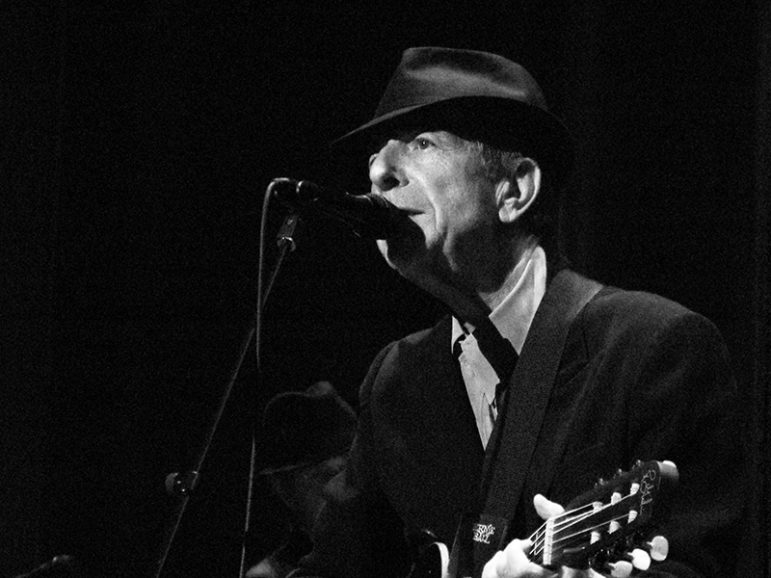Leonard Cohen has just celebrated his 82nd birthday — which makes him the oldest rock star in the world.
In celebration of his birthday, Cohen has released a new song, “You Want It Darker,” from his forthcoming album.
The song is not only hauntingly beautiful. It is also one of the most profoundly Jewish statements in all of popular music.
(And did the New York Times really have to give Leonard Cohen a snarky birthday gift of declaring what many of us have already suspected — that his iconic “Hallelujah” is well on its way to becoming a cliche?)
Check out the lyrics to “You Want It Darker.”
…Magnified, sanctified, be thy holy name
Vilified, crucified, in the human frame
A million candles burning for the help that never came
You want it darker
Hineni, hineni
I’m ready, my lord
There’s a lover in the story
But the story’s still the same
There’s a lullaby for suffering
And a paradox to blame
But it’s written in the scriptures
And it’s not some idle claim
You want it darker
We kill the flame
They’re lining up the prisoners
And the guards are taking aim
I struggled with some demons
They were middle class and tame
I didn’t know I had permission to murder and to maim
If you are the dealer, let me out of the game…
Hineni, hineni
Hineni, hineni
I’m ready, my lord
That song is not only Leonard Cohen’s birthday gift to himself.
It is also his gift to the Jewish world — just in time for the Days of Awe, aka the High Holy Days, aka Rosh Ha Shanah and Yom Kippur.
First, the words to Cohen’s song come straight out of Jewish liturgy. Cohen translates and mischievously re-interprets the words of Kaddish, the traditional Jewish statement of faith that has come to be associated with a prayer for the dead.
“Magnified, sanctified, be thy holy name. Vilified, crucified, in the human frame.”
Moreover — he is saying something powerful. Violence to human beings “vilifies” and “crucifies” God, as well.
Why “crucifies?” This is hardly the first time that Cohen has put Jesus into one of his songs, or into his poetry. Remember his iconic song, “Suzanne“? “Jesus was a sailor, when he walked upon the water…”
For countless billions of people across the globe, “crucifies” is the most powerful evocation of human suffering. Cohen knows that.
Second, he adds the word Hineni — one of the most powerful and evocative words in the entire Bible.
It serves as Abraham’s response to God’s demand that he sacrifice his son, Isaac — which Jews hear during theological “prime time” on Rosh Ha Shanah — and which Cohen has already “covered” in his song “Story of Isaac.”
Hineni means: I am here, I am ready.
Third, his backup singers are the choir of Shaar Hoshamayim in Montreal — the Orthodox synagogue where he grew up, and the synagogue where his father and uncles had been lay leaders. The cantor of that synagogue, Gideon Zelermyer, is a featured singer on the song.
So, Cohen is not only writing a piece of liturgical music.
He is nodding, lovingly, to the Jewish roots of his Montreal childhood — roots that have always sustained him, despite his various spiritual wanderings.
Ask yourself: when was the last time that a pop singer — or, almost anyone in popular culture — paid such humble homage to his or her childhood Jewish roots?
To feature the choir and cantor of the synagogue where you grew up?
Face it. Most of American popular culture long ago decreed that it was too cool for shul.
Not Leonard Cohen. Much of his music evokes the Jewish spiritual experience — especially that of the Days of Awe.
Consider “Who By Fire” and “If It Be Your Will.”
But Leonard Cohen does not stop there.
No. Recently, Cohen’s old lover-muse, Marianne Ihlen, died. She was the subject and inspiration of the classic Cohen song “So Long, Marianne.”
So, how did Cohen choose to say, well, so long, Marianne?
In a letter to her, written shortly before her death, Cohen writes:
Well Marianne it’s come to this time when we are really so old and our bodies are falling apart and I think I will follow you very soon. Know that I am so close behind you that if you stretch out your hand, I think you can reach mine.
And you know that I’ve always loved you for your beauty and your wisdom, but I don’t need to say anything more about that because you know all about that. But now, I just want to wish you a very good journey. Goodbye old friend. Endless love, see you down the road.
And now we know why Cohen sang: “Hineni. I’m ready, my lord.”
As he reaches the age of 82 (more than triple the age of Jimi Hendrix, Janis Joplin, Jim Morrison, Amy Winehouse, and Kurt Cobain at the time of the deaths; it’s called, grimly, the “27 Club”), Cohen is thinking about his own mortality.
And he is saying that he is ready. Like Moses at the end of Deuteronomy, he is ready to surrender to the Divine Decree — whenever it might come.
Hineni, Lord.
It is the ultimate message for the Days of Awe.
May you live to be 120, Leonard Cohen.






